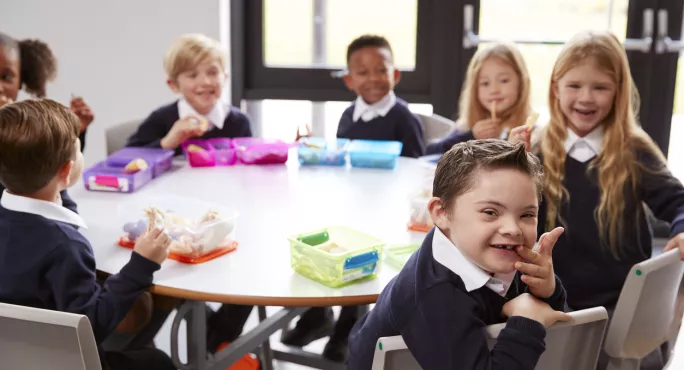SEND: Schools ‘forced to pick up pieces’ during Covid

Schools have been forced to “pick up the pieces” as pupils with special educational needs and disabilities have been “overlooked” by the government during the Covid crisis, MPs have claimed.
A new report from the All-Party Parliamentary Group (APPG) for Special Educational Needs and Disabilities (SEND) also says that some of the country’s most vulnerable pupils were refused school places on the basis of risk assessments “often conducted without the input of families or the young people themselves”.
Following evidence sessions with parents, teachers and pupils, the APPG, a cross-party group of MPs, concluded that the Department for Education “did not do enough to support children and young people with SEND during Covid-19”.
SEND: Review delayed until next year due to Covid
Exclusive: DfE criticised for ‘tick-box’ response on SEND
Report: MPs warn that a generation of SEND pupils are being failed
The group found that the most vulnerable children were “failed”, and schools were “left to pick up the pieces”.
The inquiry, launched in July 2020, found that pupils with SEND were made to feel like an “afterthought”, as guidance for special schools and alternative provision was “frequently” published later than mainstream advice.
The report adds that the National Deaf Children’s Society claimed that the DfE “failed to consult with organisations representing children with sensory impairments when seeking out feedback on draft guidance”.
Other findings include:
- The impact of Covid-related costs and income losses on schools has exacerbated SEND funding crises.
- The reduction in requirements of local authorities and schools to make “reasonable endeavours” has had a negative impact on the support available for young people with SEND.
- In some cases, risk assessments were used to refuse attendance in school for pupils with SEND. These assessments were often conducted without the input of families or the pupils themselves.
- Therapists and technicians who support the provision for pupils with SEND have in many cases not been allowed on to school sites owing to Covid restrictions.
Olivia Blake, the Labour MP for Sheffield Hallam who chairs the APPG, said: “For the past year, young people with SEND, their families and education settings have often been treated as an afterthought when they should have been at the fore of the government’s response to the pandemic.
SEND pupils ‘treated as an afterthought’
“In this report, we wanted to amplify their voices, and I’m grateful to everyone who shared their experiences with us. Many of the submissions we received were raw and anxious, reflecting longstanding problems that have been magnified by the Covid crisis.
“This report aims to focus discussion on how we address those problems and improve a system that has long-needed change.”
The APPG makes nine key recommendations based on its findings, including that future DfE guidance for schools is “fully cognizant” of the challenges facing pupils with SEND, and that an “urgent and time-bound parliamentary review” is undertaken by the government to assess the impact of the pandemic on these vulnerable children.
New funding should also be made available “in the short-, medium- and long-term” to support Covid recovery efforts for young people with SEND, the group says.
Meanwhile, the MPs are calling on the education secretary to to publish the long-awaited SEND review, which was launched in the autumn of 2019 and delayed last year owing to the Covid crisis.
Paul Whiteman, general secretary of school leaders’ union the NAHT, said the report should serve as an “urgent wake-up call” to the government.
“The report captures how children and young people with SEND have too often been an afterthought for government during the pandemic, and in many cases schools have been left to pick up the pieces with little support,” he said.
“The government must learn from this. There is a pressing need to put pupils with SEND at the heart of the educational recovery agenda. The current SEND review being carried out provides the ideal opportunity to do this.
“We agree entirely with the recommendation for greater investment. The government has said that no child should be left behind - now is the time to put its money where its mouth is and make sure the most vulnerable children in society are included in that promise.”
A government spokesperson said: “We know the impact of the pandemic may be greatest on vulnerable children and young people, including those with Education Health and Care plans, which is why we kept schools open to them during restrictions, and why getting every pupil back in full-time education has been our priority.
“High needs funding has been boosted by nearly a quarter to £8 billion in 2021-22, and we are supporting local authorities and their partners to improve SEND services for every young person with an Education, Health and Care Plan.
“This includes the programme of inspections and interim visits by Ofsted and the CQC [Care Quality Commission] to check the quality of provision as well as direct support and challenge to individual areas.
“Despite the important reforms introduced to improve support for young people with SEND, the system is not working for every pupil - that’s why our SEND review is looking at how to make sure it is consistent all over the country, high quality, and integrated across education, health and care.”
You need a Tes subscription to read this article
Subscribe now to read this article and get other subscriber-only content:
- Unlimited access to all Tes magazine content
- Exclusive subscriber-only stories
- Award-winning email newsletters
Already a subscriber? Log in



